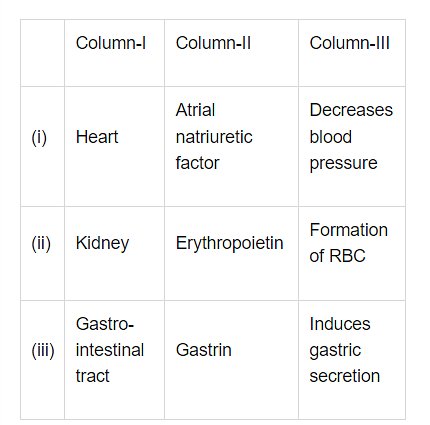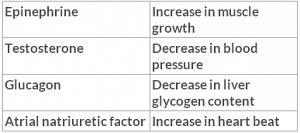Test: Hormones of Heart, Kidney & GI Tract - NEET MCQ
10 Questions MCQ Test Biology Class 11 - Test: Hormones of Heart, Kidney & GI Tract
Find out the correct match from the following table -


Assertion: Cholecystokinin (CCK) acts on the gall bladder to stimulate the release of bile juice.
Reason: CCK also inhibits the secretion of pancreatic enzymes.
Reason: CCK also inhibits the secretion of pancreatic enzymes.
| 1 Crore+ students have signed up on EduRev. Have you? Download the App |
Choose the correct answer among the following options:

Which of the following hormones stimulates the secretion of pancreatic enzyme from the pancreas?
Which one of the following part is an endocrine gland?
Which of the following hormones is involved in neutralizing stomach acid?
Match the following hormones to their functions.
Hormones:.
- Gastrin
- Secretin
- Cholecystokinin (CCK)
- Gastric Inhibitory Peptide (GIP)
Functions:
A. Stimulates the secretion of hydrochloric acid and pepsinogen in the stomach.
B. Stimulates the release of bile from the gall bladder and pancreatic enzymes.
C. Inhibits gastric motility and acid secretion.
D. Stimulates the secretion of bicarbonate ions and water from the pancreas.
Which hormone inhibits gastric secretion and motility?
Assertion: The atrial natriuretic factor (ANF) is secreted by the atrial wall of the heart and helps in reducing blood pressure.
Reason: ANF causes constriction of blood vessels, which lowers blood pressure.
|
182 videos|367 docs|152 tests
|

















